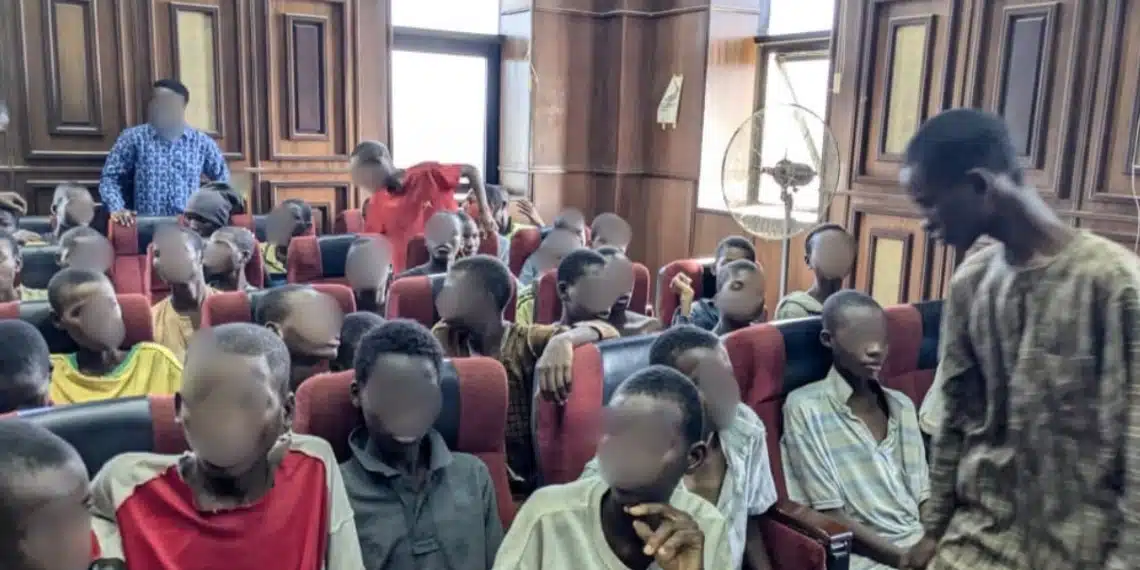There are strong indications that the Federal Government may withdraw the treason charges filed by the police against over 100 #EndBadGovernance protesters.
The Attorney General of the Federation (AGF) and Minister of Justice, Lateef Fagbemi (SAN), has reportedly received the case files and is currently reviewing them to determine the next steps.
According to the Police, Nigerian law permits the arraignment of individuals as young as seven years old, adding that they had taken “all necessary steps to ensure suspects’ rights and access to medical care.”
According to TheNation, despite this, the police handed over the files to the Ministry of Justice on Friday after the AGF’s request for a review.
Sources who spoke with the platform indicate that a team of lawyers from the Federal Ministry of Justice, led by the Director of Public Prosecution of the Federation (DPPF), has been in discussions with other parties involved in the matter.
The group reportedly plans to approach the court to reschedule the cases, initially set for January 24, 2025, to an earlier date, likely this week, with the potential goal of terminating the charges altogether.
Last Friday, the Federal High Court in Abuja, presided over by Justice Obiora Egwuatu, granted bail to the defendants with strict conditions, including a N10 million bond and two sureties.
The judge expressed concern for the minors involved and acknowledged their commitment to remain available for trial.
A Senior Advocate of Nigeria (SAN), Femi Falana, has urged the court to decline jurisdiction over the cases.
In an application he filed on Friday, Falana also wants the court to order the Federal Government to fund the education of the 29 minors among the defendants.
Falana specifically prayed the court for “an order declining jurisdiction to hear the current charges against the defendants/applicants as presently constituted.”
He also wants “an order mandating the complainant/respondent to enroll in school and bankroll in full the education of the defendants, who are minors and to pay their school fees till at least senior secondary school or university level in compliance with Section 18 (3) (a),(b), (c) of the 1999 Constitution as amended, Section 15 of the Child’s Rights Act, Section 2 of the Universal Basic Education Act, 2004, Article 17 of the African Charter on Human and Peoples Rights.”
Falana identified the minors as Suleiman Ali (16 years), Tasi’u (17 years), Ibrahim Rabi’u (16), Jamilu Haruna (16), Muktar Yahya (17), Abdullahi Suleiman (17), Suleiman David (17), Muktar Ishaq Alhassan (16) and Sani Aliyu (17).
Others are Mahmud Mustapha (16), Umar Abdullahi (17), Habibu Knows (17),Mustapha Abubakar (17), Sani Hassan Idris (17), Abdulrahaman Ibrahim (17), Salisu Adam (16), Bilal (15), Amir Muhd (17),Abdul’aziz Adam (15), Sadiq Sunusi (15), Ibrahim Sani (17), Hassan Muhd (17) and Saifullahi, Muhd (15).
Also identified as minors are Umar Ali (17 years), Musa Isyaku (15), Muhammad Musa (14), Usman Amiru (14), Abdulganiyu Musa (15) and Sunusi Nura (14 years).
In urging the court to decline jurisdiction, Falana argued that by the provision of Section 251 of the Constitution, the Federal High Court can only exercise jurisdiction over cases specifically mentioned in the said section and no more.
He added: “The Federal High court, Abuja lacks jurisdiction to entertain the charges as contained in counts two to ten.
“The Federal High court, Abuja lacks jurisdiction to entertain the cases as contained in counts two to ten of the charge which were alleged to have taken place in Kano outside the territorial jurisdiction of this honourable court.
“Some of the defendants/applicants, as can be gleaned from the charge sheet, are minors.
“Counts 6 and 10 of the charge are offences unknown to law or offences not provided for in any written law in Nigeria and thus incompetent pursuant to Section 36 (8) and (12) of the 1999 Constitution.
“By the provisions of Section 36(8) & (12) of the Constitution of the Federal Republic of Nigeria, 1999 (as amended), the jurisdiction of this honourable court to arraign a defendant over a charge is activated by disclosure of an offence known to a written law.
“It is wrong to arrest and charge minors alongside adults and remand them in prison custody alongside other inmates including convicts.
“Rather than educate and teach the minors good morals, the complainant is sending its minors to prisons all in a bid to stifle civic space and abrogate the right to dissent in breach of the 1999 Constitution and in violation of the right of the children to education and proper moral upbringing as encapsulated under Section 18 (3) (a),(b), (c) of the 1999 Constitution as amended, Section 15 of the Child’s Rights Act, Section 2 of the Universal Basic Education Act, 2004, Article 17 of the African Charter on Human and Peoples Rights.
“These minors amongst the defendants herein are entitled to have their right to education preserved by this honourable court of justice.”
Credit: NaijNews















Comments are closed